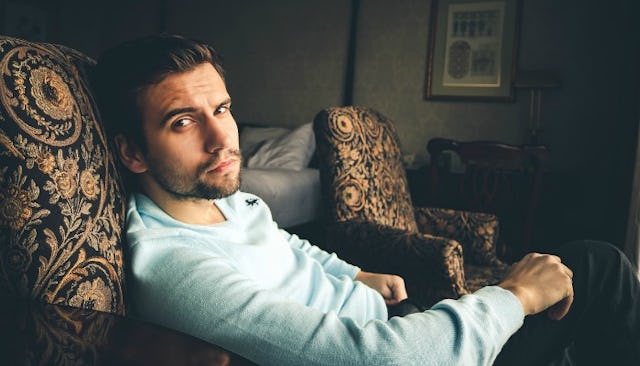My Husband And I Have Different Perspectives, But I Try To See Things Through His Lens

The moment I became a mother, I began to see every aspect of my life through that filter. The births of our children soon became my most empowering accomplishments. Nursing, rocking, and changing babies became my most important life’s work. Scaring away nightmares with my mere presence became my superpower.
Through that filter, my loving relationship with my husband morphed into a partnership in parenting. After 16 years raising kids together, our marriage has evolved into a complex network of mutual support, “quick, lock the door” intimacy, mundane chores, and the near-constant work of child-rearing.
When I look at my husband, I see a gentle man who takes care of his family, who finishes home improvement projects, who isn’t afraid to talk about feelings, who makes me laugh, and indulges my chocolate needs. When I look into his eyes, I see our past, present, and future. But when I try to look at life through his eyes, I see that as a father and husband, our past, present, and future look a bit different.
Those differences start from the very beginning of our parenting journey. When I think of our babies, I can still feel them inside my body. He can’t do that, no matter how hard he tries. When I hear a crying baby, my instinct is to put them to my breast. My husband will never experience that, no matter how great his fathering instincts are.
It must be so different not to have a primal, physical response to looking at our kids’ baby pictures. And it must be strange, wonderful, and somewhat scary to watch your spouse go through the bodily upheaval of pregnancy, childbirth, and postpartum with no idea how it feels. It would be odd to be removed from that experience, yet intimately a part of it.
As I look at life through my husband’s eyes, I think about our society’s expectations of men and fathers. What would it be like to feel that pressure instead of the pressure I feel as a woman and mother? My husband’s income primarily supports us, and though I know that’s not always the case, it’s still very much the societal expectation. The idea that a “real man” supports his family financially is an unspoken given. Since we’ve had kids, I’ve always worked part-time, but when money feels tight, he’s the one who feels like he’s not doing enough. The threat of a job loss is a lot scarier through my husband’s eyes.
I think about what it means to be a male role model, both for our son and for our daughters. Debates over masculinity and femininity look different through these eyes, especially through the haze of society’s frenetic debates about such things. How would I prepare our daughters for relationships from a father’s point of view? How would I talk to our son about the changes he’ll go through on his way to becoming a husband and father himself?
As I wonder what it’s like to think about those things from a male perspective, I take note of our society’s unfair expectations of men. I’m so used to navigating the ridiculous hoops women are expected to jump through that I’ve rarely stopped to notice the obstacle course of expectation my husband goes through at times as well.
I think about what it means to be a husband. What would I expect of myself in that role? What would I want from me if I were in his shoes? This perspective is harder for me to see, but it’s worth trying.
I know that my husband sees me working, struggling, feeling overwhelmed, and he does everything in his power to make life easier for me. As I look through his eyes, I see how easy it would be for him to not do those things, and I wonder if I do enough for him. Do I show him I appreciate him enough? Does he need something more or different from me?
I know I’ll never be able to understand exactly what life looks like through his eyes, just like he’ll never know what it looks like through mine. But it’s a worthwhile exercise to try to see things from one another’s perspective, to realize that even though we’re looking at the same house and the same kids, our views are fundamentally different. That sense of empathy and compassion can only make our life together better. And it can make the view through our own eyes clearer as well.
This article was originally published on